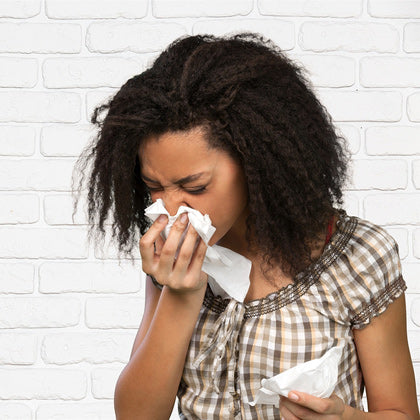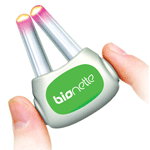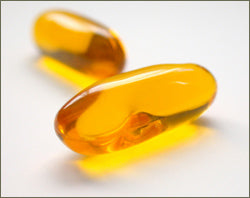Natural Allergy Solutions

(Featured as a Two-Part Article in Lifestyles 55)
While most Winnipeggers are happy to have survived another winter, spring can make many allergy sufferers wish winter had stayed around a bit longer.
With the annual awakening of vegetation that had been dormant or covered in snow, along come the most common seasonal allergies like hay fever. Also called allergic rhinitis, hay fever is usually triggered by weed or grass pollen, although dust mites, mold, and pet dander can also be causes.
Exposure to allergens doesn't cause a reaction with most people they're usually harmless. Allergy symptoms occur when the body mistakes these particles as invaders, setting off a strong reaction and production of the antibody immunoglobulin-E. The next time you are exposed to that allergen, your immune system causes specialized mast cells to release various chemicals including histamine. These reaction chemicals produce the classic allergy symptoms including congestion, itchy eyes, sneezing, and mucus production.
A troubling aspect for many older people is that allergens that have never produced a reaction in the past can become a trigger later in life. As we age, it is critical to keep our immune system in balance. We want to avoid the 'overreactions', but we also need our immune system to protect us from potential environmental threats like pathogens and harmful microbes.
Fortunately, there are a number of products designed to help ease allergy symptoms naturally by either eliminating the allergy triggers or by modulating the immune system to prevent the exaggerated response.

LED Phototherapy
A study published in the International Journal of Pediatric Otorhinolaryngology found a significant improvement in symptoms of allergic rhinitis in children using LED phototherapy. Bionette produces a specific 630 nm wavelength of red light that can be very effective for treating seasonal allergies. The device is inserted in the nose for 4.5 minutes, for up to three times a day initially, reducing to once or a twice a day once symptoms have improved.
Nasal Rinsing
Shaped like a small teapot, the neti pot is one of the most popular natural products that helps relieve allergy symptoms by cleansing the nasal passages with a salt solution, using 2.5 grams of salt in 8 ounces of warm water. Simply insert the spout into one nostril and tilt your head to one side, allowing the warm saline solution to travel up one nostril and down the other, washing out dirt, dust, and pollen.
Personally, I prefer a more modern version of this traditional solution. The Nasaline rinsing system allows you to control the flow and pressure, making it easier to use and more effective than a neti pot.
Conventional salt solutions can dry out the nasal passages, and some find the solution a bit harsh for the delicate nasal membranes. I recommend a buffered salt/xylitol solution that combines sodium bicarbonate and xylitol with powdered Himalayan crystal salt. A natural sugar alcohol found in many fruits and vegetables, xylitol keeps the nasal membranes moist and helps prevent bacteria from adhering to the nasal passages, enhancing the effect of the salt solution.
To make your own buffered salt/xylitol solution, mix 100 g of baking soda with 300 g Himalayan crystal salt (fine powder) and 800 g of xylitol. This mixture should be enough for about 200 cleanses. Use 6 g (about a teaspoon) for every 8 ounces of water.
Nasal Spray
Easier to use than a neti pot, saline sprays can help with symptoms but generally are not as effective as a neti pot or Nasaline. I recommend Xlear as a superior alternative to regular saline sprays as it combines a saline solution with xylitol, better protecting delicate nasal tissues while keeping them hydrated.
Air Filtration
One of the best ways to reduce indoor allergy symptoms is with a HEPA air filtration system. HEPA filters trap pollen, mold, and many other allergy triggers. For best results, keep windows closed to prevent allergens from entering the home. Portable units can be more effective in small spaces however, HEPA filters that are attached to your HVAC system are recommended as they reduce allergens in the entire home. Combining both solutions is ideal.
Disinfection
HEPA filters help to remove airborne particles, but they can't kill all the bacteria present in our living environment. New technologies that produce OH radicals can kill up to 10 times more pathogens than photocatalytic oxidation, the conventional method of generating OH radicals in air purifiers. An exciting new disinfection system developed in Korea, the Air Vaccine 015+ is especially effective for rhinitis and respiratory infections. Suitable for spaces up to 1300 square feet, the Air Vaccine works to remove 98% or more of dangerous contaminants like E. coli, smallpox virus, Influenza type A (H1N1), and many other volatile organic compounds in just a few hours.
Mold Remediation
Many older homes (particularly those with damp basements) can have mold that infiltrates the home. If allergy symptoms persist, hire a company to test the air. If mold is present, there are companies that do mold remediation and can help ensure that it won't be an ongoing problem. Ideal as a preventative measure in homes and cottages, the Airfree Onix 3000 air sterilizer safely uses heat to help reduce indoor pollution by incinerating mold spores, bacteria, and viruses.
Bedding
As many allergy and asthma symptoms are caused by dust mites, it is important that you work to eliminate mites from your bed, bedding, pillows, carpet, and furniture. I recommend breathable total encasement mattress and pillow protectors that use silver ions to kill dust mites and bacteria. Mattress protectors like PureCare and Natura's Protect Deluxe are effective at reducing allergy symptoms, as they integrate silver ions in the fabric (killing mites and bacteria).
These lifestyle recommendations can help you to effectively deal with allergy symptoms. The next article will outline foods and dietary supplements that can help balance the immune system and prevent the overreaction that ultimately causes allergy symptoms.
Part II
In the last entry in this series, I outlined a variety of products and lifestyle changes that can help to reduce or eliminate allergy symptoms including phototherapy, nasal cleansing, and air filtration. In addition to lifestyle modifications and environmental improvement, there are a number of natural supplements that can reduce allergy symptoms.
As mentioned in Part I, exposure to allergens doesn't cause a reaction with most people the particles are generally harmless. Allergy symptoms occur when the body mistakes these particles as invaders, triggering an overreaction of the immune system that causes increased production of the antibody immunoglobulin-E (IgE). The next time you are exposed to that allergen, specialized mast cells release various chemicals including histamine which lead to the classic allergy symptoms including congestion, itchy eyes, sneezing, and mucus production.
Probiotics
The connection between the microbiome (our gut microbiota) and the immune system is one of the most active areas of medical research today. Our immune system health is closely linked with healthy oral and gastrointestinal bacteria. Increasing levels of good bacteria through supplementation can help to balance immune response and prevent the overreaction to allergens. I recommend a quality probiotic, taken two to three times a day.
Nutritional Supplements
Some of the powerful dietary supplements that work to balance the immune system include Proligna pine cone extract, plant sterols, Pycnogenol, magnesium, zinc, stinging nettle, olive leaf extract, and quercetin.
Proligna Pine Cone Extract (PPC): Pine cone extract has a long history of usage around the world, particularly in Japan. Fourteen patents and over 31 peer-reviewed studies support its use for immune enhancement, antiviral, antibacterial, and anticancer activities. I take one small capsule daily, and have not succumbed to a cold or flu for as long as I've been taking it.
Allergy research has identified the importance of dendritic cells in helping balance the immune response that results in allergy symptoms. PPC boosts dendritic cell development nine-fold in just nine days, and reduces IgE two-fold in fourteen days, while promoting disease-fighting T cell response.
Plant Sterols: These naturally occurring plant fats are found in whole grains, nuts, seeds, and legumes. Plant sterols have a wide range of health benefits including helping to modulate the inflammatory response to allergens. They can also help lower cholesterol, block the enzyme associated with male pattern baldness and enlarged prostate, and decrease levels of cortisol -- the stress hormone that can adversely affect the immune system.
Nature's richest source of plant sterols is rice bran solubles. Supplements that work well to alleviate allergy symptoms have a minimum of 117 mg of beta-sitosterol per capsule, combined with Cellasate and Enzogenol. Cellasate is a blend of essential fatty acids designed to increase bioavailability, and Enzogenol is an antioxidant and anti-inflammatory plant compound from the bark of New Zealand pine trees.
Butterbur (Petasites Hybridus): An herb frequently prescribed for the treatment of migraine headaches, recent research found it to be as effective at reducing allergy symptoms as a well-known anti-histamine drug, but without the drowsiness that is a common side effect.
Black Cumin Seed Oil (Nigella Sativa): Also called black seed oil, many health professionals believe this oil to be among the most powerful natural immune balancing products, with a tremendous range of health benefits. For allergy relief, I recommend two 500 mg capsules twice a day, or one tablespoon of black cumin seed liquid daily.
Pycnogenol: Research indicates that Pycnogenol reduces hay fever, nasal, and ophthalmic symptoms. Additional benefits may be seen when taking it for at least 5 weeks prior to allergy season some users report being able to lower or eliminate their allergy or asthma medications. An extract from French maritime pine bark, Pycnogenol is one of the most effective supplements for improving microcirculation, male fertility, and athletic performance. It helps maintain beautiful healthy skin, and can reduce the risk of cardiovascular disease (including deep vein thrombosis and varicose veins).
Olive Leaf: When taken at the onset of symptoms, olive leaf helps the body produce a decongestant effect in the body. I prefer the liquid complex, which is higher in anti-inflammatory components than olive leaf extract capsules. Olive leaf can also help normalize blood pressure and reduce the incidence of colds and flu.

Omega-3: A German study found those with the highest levels of omega-3 essential fatty acids were less likely to overreact to potential allergens. Researchers found the higher the omega-3 levels, the greater the effect. Omega-6 fats can cause inflammation, while omega-3 fats are anti-inflammatory. I recommend a balanced 1:1 ratio of omega-6 to omega-3 fats in the diet, and avoiding oils high in omega-6 including grapeseed, corn, safflower, sunflower, rice bran, canola, peanut, walnut, and soybean oil. Choose oils high in monounsaturated fat (olive, macadamia nut, avocado), saturated fat (coconut, red palm, MCT) and omega-3 (camelina and flax).
Vitamin C with Bioflavonoids: Two to three grams of vitamin C taken in divided doses (ideally 500 mg every four hours) can be effective at reducing allergy symptoms. Choose a formula with bioflavonoids, which help strengthen capillaries and stabilize mast cells. I recommend buffered forms of vitamin C, which combine ascorbic acid with minerals like magnesium and calcium to increase the alkalinity. Mineral ascorbate forms of vitamin C are easier on the stomach, with the added benefits derived from the minerals in the formula.
I also recommend vitamin C formulas that use threonic acid enhanced buffered calcium ascorbate combined with alpha lipoic acid, a powerful antioxidant that recycles vitamin C in the body. This combination maintains high levels of vitamin C in the bloodstream for up to 12 hours, while most formulas must be taken every 3-4 hours for optimal results.
Quercetin: One of the most effective natural antihistamines, quercetin is a bioflavonoid found in onions, apples, blueberries, okra, buckwheat, olive oil, citrus fruits, green tea, and red wine. Quercetin may also be effective at reducing symptoms of asthma. Researchers at Tufts Medical Center found that 300-1000 mg per day can help alleviate allergy symptoms by reducing the inflammatory response.
Stinging Nettle: The roots of stinging nettle have traditionally been used to help reduce an enlarged prostate, but the shoots can be effective for treating kidney stones, arthritis, and allergy symptoms including hay fever. In a recent study, 60% of those taking 300 mg per day experienced relief.
Zinc: Studies show that over 40% of seniors are deficient in zinc, one of the most important minerals for the immune system. When histamine-producing mast cells are zinc deficient, zinc lozenges can help stop the release of histamine and provide quick relief, often lasting up to 12 hours. Oral lozenges containing zinc acetate or zinc gluconate are usually recommended to help combat the common cold, but with continued use, some find that allergy symptoms disappear completely. I recommend taking a multivitamin that supplies a minimum of 15 mg of zinc per day, but if you are a vegetarian or don't often eat animal products, I recommend 30 mg.
Magnesium: According to Terry Phillips, Ph.D, magnesium deficiency definitely accentuates the allergic situation. A key nutrient that is required for over 360 biochemical reactions in the body, over 60% of the population is deficient, and many pharmaceutical drugs interfere with its absorption. Magnesium helps relax constricted airways while inhibiting the release of histamine from mast cells. Studies have found that higher levels of histamine are associated with magnesium deficiency. I recommend a multivitamin that contains a 300-500 mg of magnesium per day in divided doses. For the highest bioavailability, I recommend Magnesium Synergy from AOR, as it also contains zinc and nutrient cofactors that improve magnesium absorption.
The key to alleviating allergies is modulating the immune response to prevent the overreaction that results in allergy symptoms. The recommendations outlined here can help control the response without the side effects of prescription medicines, and can provide additional natural health benefits.
Health Disclaimer. Copyright ©2016-2019. First published in 2016, last major revision in July 2019. Nathan Zassman is a trained nutrition practitioner and the owner of Aviva Natural Health Solutions.
